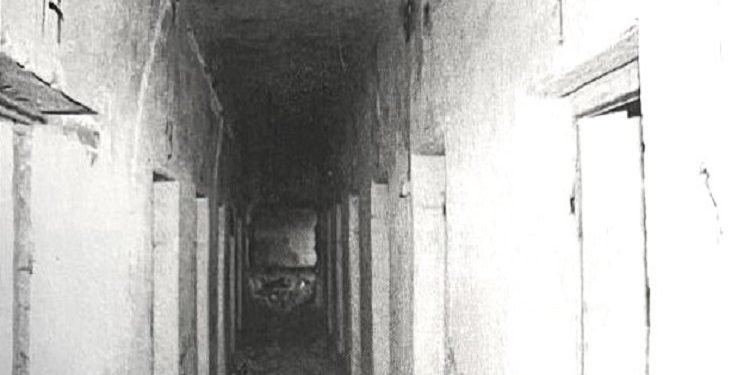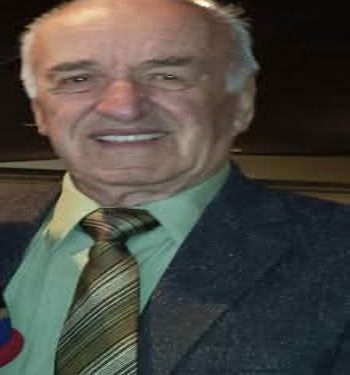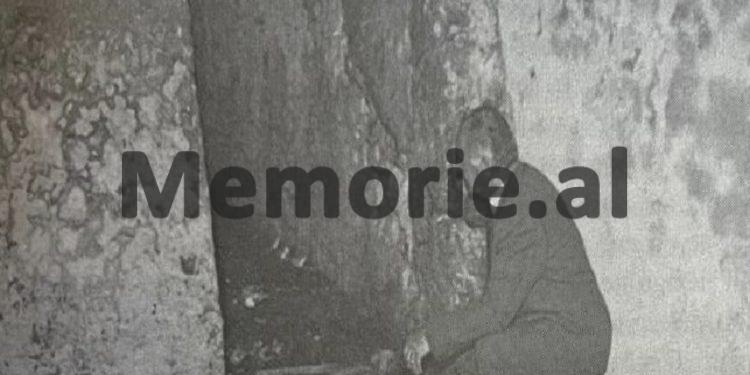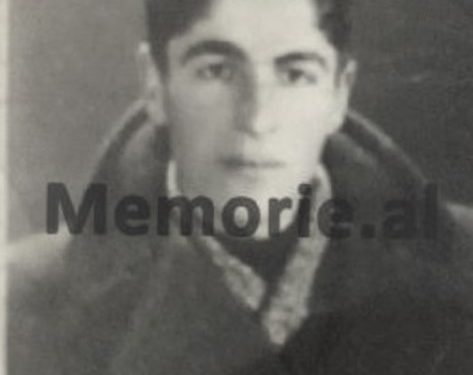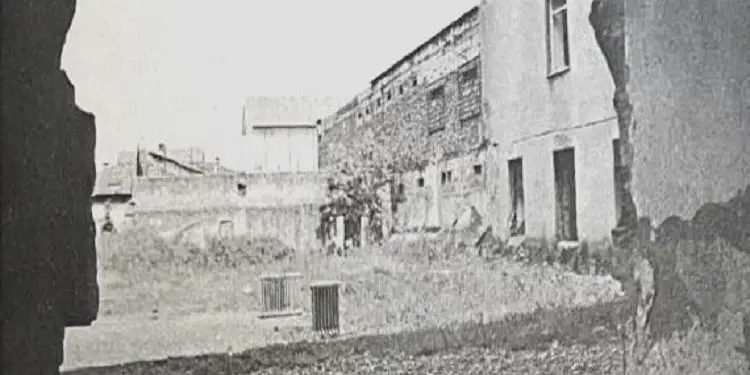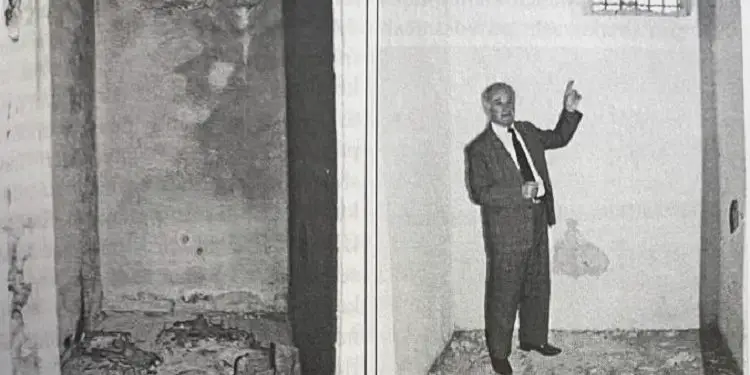By Ahmet Bushati
Part forty
Memorie.al/ After the flag was altered in 1944 with the addition of the communist star, Shkodra transformed into a center of resistance against the regime, paying a high price for its tradition of freedom. By April 1945, high school students, already feeling betrayed by the promises of the war, gathered to oppose the new terror that imprisoned and killed innocent people. Communism turned Kosovo into a province of Yugoslavia, while Shkodra was punished for its “historical crime”- its defiance against invaders. The “Postriba Movement” became a tool to suppress all dissent, plunging the city into an unprecedented spiral of suffering: imprisonments, executions, and the destruction of families. The high school students, alongside citizens, became symbols of resistance, while some “young communists” turned into tools of the State Security, leading to expulsions, imprisonments, and internments.
Four times, Shkodra rose in armed rebellion, but history forgot these battles. This book is written to remember the countless prisoners, the tortured, the killed, and the parents who suffered in silence. It is a warning against dictatorship and a plea for future generations not to forget the sacrifices made for freedom.
Continued from the previous issue
In the Footsteps of a Diary
I had not seen a sunrise or sunset for more than a year, but a sunrise so magnificent and magical, as the one that was appearing to me that morning, I had absolutely never seen in my life. Following with my gaze the entire Sheldie mountain and beyond, I was noticing how, against the gray background behind it, a part of the sky continued to burn, the blood color of which spread quietly, opening more and more into a delicate, delicate crimson. Next, it would not be long before the already silvery round sun, which had been climbing slowly and secretly from behind the mountain, would emerge full and imposing above its peak, to pour its life-giving rays everywhere across the field and into the city, without fail, through the large windows, freely and without sparingly penetrating even into the room where I was.
I was enchanted by the beauty of the sunrise with such fantasy of a clear winter day, the sunrise, that as I was nailed to the window, I would follow it with great curiosity and impression. The light, above all the light, and then the vast and free space in front, the courtyard below, the very room, bathed in light and paneled, caused my mind to change so much that when I remembered for a moment the dark dungeons of the Sigurimi, including my own, number 12, they seemed to me as they really were: like the tombs of a catacomb and the prisoners within them, like the most miserable beings on earth. A deep feeling of pity for those prisoners, and a burning desire to remain where I was, overcame me with great force.
So, since I suddenly found myself in an ordinary room of a house and the wonderful appearance of a sunny day, it was enough for me to feel that dormant life was stirring within me. Even though I had not consciously accepted that I had become a “renegade” of the dungeons, I would repeat to myself over and over again; “Is there any way they can wash me here”?! Until it was not long before the face of the head of that prison appeared once more at the counter, who would say to me coldly: “Ready”? and immediately open the door of the room for me, behind which two policemen were waiting for me, one of whom put handcuffs on my hands.
In no more than ten minutes, I would find myself back in my dungeon and before long, I would have forgotten everything else, not even excluding the sunny room of that prison that I had just left, to come to terms with the dungeon and its conditions. So, how powerful was and remains in every case in man that wonderful quality of his, which in a foreign language is called “rasencion”, a special quality, which makes man capable of adapting to any new circumstance, whatever it may be.
I got stuck badly
After a few more days, Ali Xhunga would call me for the last time. As soon as I had taken the step to enter his office and at the very moment when the policeman standing behind me was about to close the door behind him, a voice of a bad man from an opposite door would address me ironically: “Here you go, Mr. Ahmet Bushati”! I still hadn’t brought my face to him, I realized that that voice was Ferit Mandisa’s. I quickly turned my head to respond with more hatred than ever, but the policeman, who immediately closed the door behind him, made me take back the words that were on the tip of my tongue, out of sheer desperation.
But I nevertheless, in a fraction of a second, had managed to see his idiotic face and his square teeth that he had bared from the pleasure he was experiencing looking at me even after a year with handcuffs between my hands, and in that physical condition that I was. I also noticed how, supposedly for elegance, he had worn a “bag”, which even more highlighted his large head. This was a man, so much identified with the criminal work of the Sigurimi, that he had even turned a room in his house into an investigation office, where at a certain hour after lunch, some of the girls who “played the game” at the Shkodra gymnasium would be forced to appear before him, at which point they, trembling, would sign declarations of cooperation with the Sigurimi.
Finally, I was stuck badly, very badly, unable to answer that man, who for several years had been enjoying the suffering of others, that man who had first become a spy out of exuberance and not out of need or purpose, that man who, although intelligent, left much to be desired, but who, on the other hand, would develop a diabolical behavior from a supposedly good and “sociable” man, whenever it became necessary for him to trap anyone, even those with whom he had grown up in the same neighborhood and had been classmates for years; that man, who like no other, would bear upon himself the contempt and hatred of our entire high school, as one of the direct causes of the persecution and suffering of some of the students and their families, regardless of whether he himself came from a house with a good name in Shkodra and, who also had a good and peaceful brother before him.
Ali Xhunga received me coldly and seriously as usual, without speaking or looking at my face. As for the procedure for appearing in court, he quickly noted my generalities and only when he called the policeman to take me back to the dungeon, would he pronounce these words without tone, but also without anger: “You will suffer all your life”! It was the first time that that investigator had not mentioned death to me. After we were sentenced, Xhevat, who was also more or less called by him at that time, would tell me how on that occasion he had asked Ali Chunga about our possible punishments, and he had answered: “It is known about Ahmeti”, always implying death, “and among the others, you will be punished more severely”? he had said to Xhevat.
In the sign of obligation
Communism, although it had penetrated deeply into the soul of the young Qemal Llazani, my cousin, since the war, had not managed to ruin the education he had received from his good parents, nor the respect and love they had for their relatives, with whom he would never sever ties, even though they had generally been opponents of the regime he was serving with conviction and dedication. Above all, I was grateful to this cousin for the moral support he had constantly given to my very desperate family, at a time when it was in great need of a few kind words and a little hope.
One day, shortly after lunch, when the so-called “turn” was still in its infancy, I recognized Qemali from inside the dungeon by his voice. When he stopped in front of the door of my dungeon, he asked Ismail Lulo: “Who is here?”
– “Ahmet Bushati”, – he replied. “Open up”, Qemali ordered in the tone of the position of a prosecutor that he was, just as he had done in the three or four dungeons before mine, which he had probably used to cover up his deliberate entry into my dungeon. “It is forbidden” – I heard Ismail Lulo tell him and Qemali, leaving him with that, left.
As the days passed, things began to calm down and some meetings that the family had held around that time with me, had Qemali’s hand and their value, perhaps better than I, the people of the house knew how to appreciate. From that time on, Qemali would come to my cell several times, usually shortly after lunch, and would constantly ask to see the condition of my wounds, which I would try to avoid.
Even after I was sentenced, whenever Qemali came to prison, he would ask to see me and, regardless of the people he was associated with – usually key Sigurimi employees – he would speak to me as if I were his own man. There were times when I was hidden from Qemali in the Great Prison, not only to avoid misunderstandings from some inmate who did not know me well, but also so that Qemali himself would not be put in a position vis-à-vis those with whom he had come to prison.
And regarding the first meetings I had with the family at Sigurim, the state in which they saw me, so unhealthy and white-faced as if I had just emerged from the ground, and especially the emotions they would experience on such occasions, would be worth describing, but without further ado, I will tell you just one of them: when on one occasion, together with the people of the house, a large number of women, like aunts, uncles and their children, came to meet me for the first time, two things would impress them:
First, my difficulty in opening my eyes due to the strong light of the large office and distinguishing them one by one, and second, when at the end of the meeting, among other things, they would ask me to let go of some other “heads” in my hands, which would immediately slip from my hands that continued to hold nothing, what would make their faces, which had been more moved than smiling a few moments before, pale and numb with sudden surprise and despair!
With Gjon Ljarje at Qemali’s prosecutor’s office
One sunny morning in January, they took me out into the prison corridor and from a cell on the other side of the corridor, they also brought Gjon Ljarje, whom I was seeing for the first time. They tied us hand in hand, and with a policeman in front and another behind, as well as Sergeant Mënyri on one side, they took us out of “Dege” onto Jezuitëve Street, past the “Rozafat” cinema and finally onto the main street, towards the committee.
The good day and the people on the street, who despite the general situation, who were going about their daily business as usual, made me feel something unpleasant and a kind of revolt that was looking for a reason to vent it. Qemal Draçini had also experienced such an impression, as a friend of mine, who had been in the same prison cell with him, would later tell me. When he was once taken out of the former recruitment building – we turned it into a prison at that time – to be sent to the investigator, after he had returned to that prison, he expressed himself sadly: “I was impressed by life outside, people were coming and going. Everything continued as before. How unfortunate that I left”!
And truly, as I said above, contact with free life revolts the prisoner. Not only because of my physical disabilities, but also because of my reaction, I was walking quite slowly, so much so that the two policemen, especially the one behind me, would approach me several times along the way and, speaking to me angrily, but without raising his voice so that the passers-by wouldn’t hear him, would say to me: “You go, I’m telling you to go”! while I was also restraining Gjoni. I was not lucky enough to see any familiar people that day, but the greeting that the student Çita Simoni, who was passing by on the sidewalk a little distance from us, addressed to me with warmth, made a good impression on me and, I believed, as prisoners believe, that that greeting had expressed exactly what a political prisoner wants and means.
At the moment we were entering the committee, there on the landing of the stairs at the entrance, another impression: two children from a neighborhood, with whom only a wall separated us, were saying to each other in a hurry and surprise: “Ahmet! Ahmet”!
In Qemali’s office, – an office with which I believed that our work had no connection – Gjoni was called first, while I waited my turn leaning against the wall, and, from time to time, arguing with a policeman, who told me to come with my face to the wall, which I had the power to do, and because of my anger, I did not do. “You’ll see what we’ll do to you when we bring you back, your black man”! – were the words of the policeman who threatened me. When we returned to prison, Sergeant Mënyri would only respond to his complaint about me with a short smile.
After Gjoni, I entered Qemali’s office, and as I sat down in a chair opposite him, he said to me: “Metti, I called you to tell you that I have nothing to do,” and as if to explain something more to me, he would formally and perhaps – perhaps to cover up the traces of the real purpose of the call, engage one of his typists to carry with me a supposedly formal act, which he might have torn up at the first moment so that it would not happen again in the office. It was funny, because even that girl named Fiqirie Kadia would try to avoid Qemal, never looking at my face, while she typed my answers to every standard question she had written down. This also happened with a former student whom I had known and met several times, and, moreover, under completely friendly circumstances.
When we left the committee, a woman who had stopped about twenty meters in front of us, – and who had been watching us attentively until then – began to walk more slowly. Since she took John’s arm, I was convinced that she was, if not his mother, then someone else. When, after a few steps that we had taken, we reached her – who was deliberately walking slowly – without turning her head away from us and as if she were talking to herself, she would pronounce in a thick voice that she had: “How can I have you, I wish I had a mother”?! – and he would have continued walking in step with us, alongside John, perhaps hoping that his son would answer him, but John, being John, with that special wisdom of his, apparently more to avoid the intervention of any of the policemen, was content to answer his mother only with a smile and, without looking at her face, while I was saying: “John, tell your mother, tell her that you are okay”!
A criminal’s conscience is killed!
Experience has shown me that even the conscience of a criminal can be killed and that the case of Ismail Lulo was not the only exception to the general rule. Even though Enver Hoxha’s turn was demagogy, it actually meant that at least in the Sigurim, there was no more torture for a while, some lives were saved on that occasion, and finally some facilities were made available to the prisoners.
It is known that the passing of the Sigurim, supposedly concentrated in the sole hands of a Koçi Xoxe, would have punished them enough to pass the turn for Enver Hoxha to manipulate a difficult situation after the breakup with Yugoslavia, but meanwhile, such an act, although formal, would not pass without necessarily touching the conscience of some criminal, so even of an Ismail Lulo, at least related to me. He was no longer behaving brutally with any prisoner, and he had even begun to do me some small favor, without asking to be pointed out to me or looking me in the eye, as well as without speaking to me about anything and ever.
At the time we are talking about, whenever Ismail Lulo came to the prison for various tasks, day or night, he would turn on my light, contrary to the rule that the lights were to be turned on for everyone at a certain hour of the evening. The food that the house brought me, including the cases of fruit, would no longer be touched for any reason. He generally remained silent, which told me that he was perhaps reflecting for the first time, after four years of madness.
Since February, or a little earlier, Ismail Lulo had disappeared from our prison. I believed that, for the sake of opinion, the opportunistic circulation of the turn had included him. It must have been half of April when, one afternoon, I heard his voice. From the words he was exchanging with the policeman on duty, I understood that he had just returned from Kukës, where he had been on temporary duty. I was surprised by the fact that, after only a few minutes had passed, he would ask that policeman: “Yes, Ahmet Bushati, is he still here”?
Pjerin Kçira in court and in the eveningWhen, one afternoon in June, Pjerin Kçira and his friends, on their way back from a final session of their trial, entered the courtyard of our prison singing the National Anthem, I woke up confused and startled from a heavy sleep that had gripped me. I left them sweating as I was and still not having regained consciousness, I immediately stood up, quickly rolled up the mattress, and as always in such cases, climbed onto it and stretched myself out high between the bars above the door, while the police were distributing them to their respective dungeons.
As Nushi would later tell me, they had walked the path from the committee where the trial had taken place to the prison singing national songs, as well as some of the songs that Gjeto Keqi would bring out from his cell number 14. After he had put Pjerin in his cell, and after him the Sigurimi officer, Xheudet Miloti, who, in order to vent his anger at the songs they had sung along the way – not even listening to his intervention – would have launched himself like a madman at Pjerin, kicking him hard in the chest several times. Memorie.al




